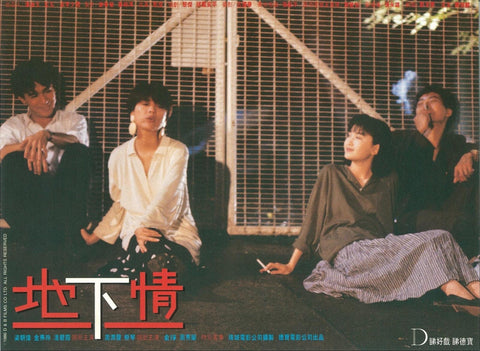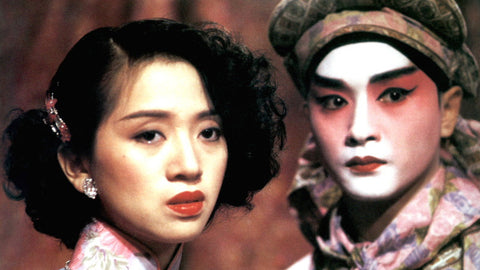Festival Report: 45th Hong Kong International Film Festival 2021 (Updated Daily)

Written and reviewed by Andrew Chan (Film Critics Circle Of Australia) as part of coverage of the festival
Help me reach one review per day in 2021. 2021 Review count - 17/365
Support me on Patreon:
 https://www.patreon.com/neofilmreviews
https://www.patreon.com/neofilmreviews
Photo Credits - HKIFF
Day 1 - Opening Ceremony - 45th HKIFF

The 45th Hong Kong International Film Festival kicked off in a cosy yet relatively low key fashion at the Hong Kong Cultural Centre on April 1, 2021. With the initial grand opening film - “When the Wind Rises” being pulled out within days of the opening, the festival opened with the gala premiere of “Septet: The Story of Hong Kong”, an omnibus film by seven acclaimed Hong Kong filmmakers including Sammo HUNG, Ann HUI, Patrick TAM, YUEN Woo-ping, Johnnie TO, Ringo LAM and TSUI Hark.

Five of the filmmakers (apart from Tsui Hark and the late Ringo Lam) all came to share their experiences of filming with the media and audience alike. This is a great film to start the festival as it is not just a simple tribute to 35mm film, but a telling of Hong Kong history and stories through the ages and eyes of some of our generation best local filmmakers.

HKIFF ambassador Aaron Kwok provided the much needed international star power as the festival kicks of 12 days of world and local cinema for Hong Kong audience to rejoice. See you at the movies.

We also got to see some familiar faces of Hong Kong cinema - Yuen Wah and Lam Suet.


Festival Day 2 - April 2
Highlight of the Day
Film Review: Love Unto Waste 地下情 (1986) - Hong Kong [HKIFF45]

Reviewed as part of 45th Hong Kong International Film Festival 2021 by Andrew Chan (Film Critics Circle of Australia)

Coming out a year before the more acclaimed “Rouge”, director Stanley Kwan created a coming of age tragic romance in the highly underrated “Love Unto Waste”. Despite starring an now rated all-star cast in Tony Leung Chiu Wai and Irene Wan in leading roles, the film also is well supported by Chow Yun Fat and the award winning best supporting actress at Hong Kong Film Awards Elaine Jin. It is perhaps fittingly to finally witness this rough hidden gem restored at this year’s Stanley Kwan - HKIFF filmmaker in focus. There are many rough cuts and editing to the film that hampers its honest intentions, but the story is excellent as it follows the route of a wasted generation going about their 20s in Hong Kong.
The star attraction belongs to Elaine Jin whose performance echoes a difficult life for a migrant single woman living and surviving in Hong Kong whilst also trying to make it big as an actress. Tony Leung Chiu Wai oozes by with his usual youthful looks, but remains dazzled and overshadowed by his female counterparts. Irene Wan is fresh and free-spirited as the love interest and aspiring fashion model. Meanwhile, Tsai Chin provides the most completed performance as the Taiwanese lounge singer before meaning her tragic fate. As we learn from Kwan, Chow Yun Fat appeared in the film without much knowledge of the role required, but yet provided a memorable edge.
All in all, “Love Unto Waste” is one of the master Kwan’s most underrated film. It is also his first venture into competing at a major international film festival in 1986. There are many aspects of focus into female characters that Kwan is such a master of. The film despite having Tony Leung and Chow Yun Fat, the trio of Elaine Jin, Irene Wan and Tsai Chin by far outshines in their roles and characters. This is a raw yet underrated film to watch.
I rated it 8/10

Film Review: Undine (2020)- Germany / France [HKIFF45]

Reviewed as part of 45th Hong Kong International Film Festival 2021 by Andrew Chan (Film Critics Circle of Australia)

There is a lot of problems with Silver Bear winning director of “Barbara” - Christian Petzold’s latest work “Undine”. As the title suggest, the film involves frequent water sequences and allergy on water and diving. At the journey, “Undine” remains one of Petzold’s much lesser work as it is rather pointless and the happenings seem far too illogical for any emotions to be involved. How lead actress Paula Beer managed to win the Silver Bear for best actress remains more bewildering than the film itself.
Paula Beer (who also starred in Petzold’s far superior film - Transit”) teams up with co-romantic lead Franz Rogowski once again. Beer plays a freelance historian who specialise in Berlin history on infrastructure is far more interested in fledging romances. The chemistry between Beer and Rogowski who plays a commercial diver works to a degree and the film could have been better off focusing on the romance and relationship dynamics than going haywire with the runs of events. When tragedy happens, it simply happens without much emotions or thoughts. This perhaps undermines something deeper that Director Petzold may be aiming at. Jacob Matschenz appears in a few scenes as the cheating lover, before being taken off screen altogether.

All in all, “Undine” is the kind of film where some moments are better than the sum of its parts. It doesn’t work entirely and doesn’t fail miserably, but for a director of Petzold’s calibre, one cannot be faulted for expecting a lot more. In his best films, “Barbara” and “Transit”, Petzold will take the audience on the journey and keep them there, but this film fails to connect and ends up losing the audience.
I rated it 6/10


Festival Day 3 - April 3
Highlight of the Day
Film Review: Rouge 胭脂扣 (1987) - Hong Kong [HKIFF45]

Reviewed as part of 45th Hong Kong International Film Festival 2021 by Andrew Chan (Film Critics Circle of Australia)

Remastered in 4K, “Rouge” gets a world premiere re-release at the 45th Hong Kong International Film Festival 2021 as part of Stanley Kwan’s filmmaker in focus. Starring two of Hong Kong most beloved superstars and late icons, Leslie Cheung and Anita Mui (in one of her greatest performances), it is both fitting and emotional as we witness the duo presence simply dominates the silver screen. Based on the writings of Lilian Lee (whose writings include the now revived classic - “Farewell My Concubine” and “Green Snake”), Kwan adapts the story on the big screen in both a simple yet provoking manner as we witness the contrast between 1930s society in Hong Kong and its direct workmanlike 1980s.
Many things have changed, including the gender roles in question that Kwan have so often reflected in many of his beautiful films. The concept of romance also gone from being willing to sacrifice for love to being part and parcel of life itself. Alex Man and Emily Chu as modern day couple provides the excellent contrast to Leslie Cheung and Anita Mui’s characters. Mui in particular is outstanding as Fleur and manages to provide an depth look into a role that is tailor made for her. There were so many different appearances and looks that made the character a truly memorable yet tragic one to endure. Cheung gives the his character both the weak minded side as well as the persistent in love over heels to be with Mui despite his rich family interference.
All in all, “Rouge” is a simple tragic love story disguised within a time-warp ghost modern day tale that is simply enhanced by the direction of Kwan and its superstars. It’s almost like an opium lover’s dream the audience end up sitting through. The film ages well as the nostalgia factor adds to the equation, but at its core, the best memories of the much missed duo are gracefully alighted on the screen. Of course, Leslie Cheung would go on to make the acclaimed “Farewell My Concubine”. For, Mui, this is really her film and she made it her own for the ages.
I rated it 8/10

Festival Day 5 - April 5
Highlight of the Day
Filmmaker in Focus Stanley Kwan - Face to Face [HKIFF45]

Reviewed as part of 45th Hong Kong International Film Festival 2021 by Andrew Chan (Film Critics Circle of Australia)
Being one of the standout directors of our generation with an expertise in directing women roles that creates multi dimensional characters, Stanley Kwan have graced our screens with plenty of all time classics. The epic masterpiece “Center Stage” was created at only 33 years old and directing 26 year old Maggie Cheung in a Berlin Film Festival winning performance. Over the years Kwan have become a director who constantly communicate to the audience, himself and the actors through the film medium. It is this constant communication that creates the Kwan’s legacy of films and beyond.

For the 45th Hong Kong International Film Festival, Edward Lam sits down with Stanley Kwan as part of the filmmaker in focus in the face to face session. Kwan opens with plenty of praises for Maggie Cheung in “Center Stage” and he recalls how the initial premiere 30 years ago ended up with wooden cinema seats flapping during the film at 1/3 mark and half way thru. It indicates as Lam suggests that the Hong Kong audience at the time may not fully appreciate the masterpiece that Kwan was trying to portray. In filming in post modern manner switching between reality and film, Kwan tests the audience patience and as he recalls, at an earlier HKIFF screening a decade ago, he was met with a standing ovation.

Lam asks Kwan, which actress in his films that best resonance himself. Kwan expresses admiration for Anita Mui as her personality being closest to his heart. In “Rouge”, Kwan always felt Mui was outstanding and they wanted to film the sequel to “Rouge” before her passing. Another actress that Kwan associates very closely to Mui, will be the award winning Elaine Jin (“Women” and “Love Unto Waste”). Jin as Kwan would say have the the air of righteous and innate quality that makes her memorable and courageous on and off screen.

Moving on to the box office disappointment of “Everlasting Regret”, Lam mentions how the film feels a lot better years on and suggested to the festival to have additional screenings. Kwan goes on to say that every character in his films resembles a version of himself at that point in time and in essence it is like a constant dialogue and communication between himself, the film medium and the audience. He also alludes his films as romance, and each film he makes he pours his heart and soul into it, similarly to a romantic relationship.

The session ended with Kwan expression for the future of Hong Kong cinema and the next generations of directors. As Lam points out there may be no more Hong Kong stars, Kwan simply says that there are still many stories to be told in Hong Kong and with all the happenings, there are many love stories within these times that the next generations of directors should focus on.

There are plenty of wonderfully restored classics of Kwan’s works being shown at this year’s HKIFF.
Film Review: Center Stage 阮玲玉 (1991) - Hong Kong [HKIFF45]

Based in on the tragic yet inspiring life of the beautiful and talented 1930s Shanghainese actress Ruan Lingyu. In creating and directing this masterpiece epic running at over two and half hours, Stanley Kwan at 33 years of age made his possibly the most perfect film and thus cemented Maggie Cheung as a premier international award winning actress with the Silver Bear at Berlin. Like a match made in heaven, Cheung’s looks and composure are uncanny similar to Ruan as Kwan smartly infuse a film that switches between reality and movie making.

It is this technique that makes “Center Stage” a notch above its numerous stories told about the tragic life of Ruan. One moment we see actors and actresses discussing about their own lives and Ruan’s career and in another we see interviews with real life friends and directors of Ruan. In the next scene we get back to the actual movie itself. All this adds up to a beautiful film that is thought provoking as it is a dialogue between Kwan and the audience directly and indirectly.

Maggie Cheung’s transformation from flower vase roles to the impeccable and legendary Ruan Lingyu is nothing short of amazing. With only supporting dramatic roles in Wong Kar Wai’s “As Tears Ho By” and “Days of Being Wild” to boot, Cheung excels in all scenes and almost brings the character to life in the most beautiful manner. There are flaws and beauty in the character and at times, it also parallels Kwan’s own personality. Ably supported by a wonderful and hateful turn by cheating and gambling husband played by Lawrence Ng. Tony Leung Ka Fai plays her final film’s director with an edge of timid in love and action and expressive in views. Carina Lau is playful as the real life actress and friend, but lack character depth and detail.

All in all, “Center Stage” is beautiful in its execution and it’s easily Stanley Kwan best directorial effort to date. That’s a lofty call, as Kwan have made many brilliant films in his career, but this film stands the test of times. That’s brilliant as we grow to love Kwan’s works in a manner that wine gets better with age. It’s the same with Kwan’s films, but “Center Stage” goes epic yet ageless. With the restored edition release at HKIFF this year, its the kind of film that stay with you for the ages. The final look on Maggie Cheung before her character impending death remains for long.
I rated it 10/10


Festival Day 6 - April 6
Highlight of the Day
Film Review: Son-Mother (Pesar-Madar) (2019) - Iran [HKIFF45]

Iranian cinema goes dark and the sense of constant hopelessness of the country’s state of being is added with deeper unresolved misery. Such is the premises of “Son-Mother”, by feature film debutant Director Mahnaz Mohammadi and written by veteran and the assuming Mohammad Rasoulof (“Manuscripts Don’t Burn” and “A Man of Integrity”). There is a linger of sadness that seems to continuously rebound as we are shown a story begins in the POV of the mother and young widow played by Raha Khodayari and ends with the young isolated son’s POV played by Mahan Nasiri, who is required to pretend to be deaf to stay at the deaf and blind school.

I am not entirely sure what is more sad as we witness an Iranian woman trying her hardest to juggle work and life and when her job goes out the window, she is left with a brutal choice to make. Either go into a loveless marriage with the work bus driver and be apart from her son or struggles financially to feed her son and newborn daughter. What makes this film so dark and unforgiving is that there are simply no redemption and in other words, no way out of the situation.

All in all, “Son-Mother” is a difficult film to sit through as we see how poor the country have been riddled with. The gap between the poor and rich gone haywire due to the decades of wars and gender roles struggles. It is the ultimately the weakest in society that suffers the most and this is another Iranian film that shows precisely this and not for a moment, do the director nor actors allow us to rest on our laurels. In doing so, the final image of the son looking out the window and simply starring, goes a thousand miles like the breeze of constant sadness awaits.

I rated it 7.5/10
Festival Day 7 - April 7
Highlight of the Day
Film Review: Minari 미나리 (2020) - USA [HKIFF45]

There is a lot of beauty and natural touching moments in acclaimed Korean-American director Lee Isaac Chung’s “Minari”. It is as much about an American Dream as it is about human characters, family situations and a personal immigration story told in the softest of lens along with the beautiful country-side. Change is difficult and relationships take a toll as 1980s immigration story takes center stage that remains relevant to so many of us. The focus on tiny details and human interactions and soft touches are what sets this film apart from its genre and making it easily one of the best film of the year.

Steven Yeun plays a serious Korean-American husband and father with bigger dreams of supplying the niche market of Korean vegetables to the Korean community in the city. Yeun is wonderful with an understated performance that provides the audience with both hope and despair. Korean actress Han Ye-ri gives her best performance yet as the wife and mother trying her best to keep her family together against the odds. The subtle moments and fights between Yeun and Han are realistically depicted. This is further aided by veteran Korean actress Youn Yuh-jung who brings natural credibility as the grandma who became essentially central to the crucial emotive moments and touching finale. Youn elevates her work to a level that makes the film a notch or two better as her eyes becomes layered with strong emotions.

All in all, “Minari” is not so much about the American dream or a simple immigration story, but ultimately about what is important to a family and that is staying together against the odds through the ups and downs. Water becomes a prominent theme throughout the film, perhaps suggesting how it can flow with hope as it contrast fire that destroy the dreams and hopes. The irony however, it takes a moment of hard reality before the realisation of the family to understand what truly matters. This is easily one of the 2020’s best film and one that lingers with emotions and heartfelt.

I rated it 9/10



